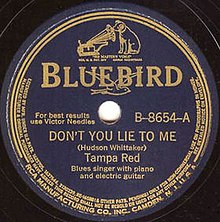Recordings by other artists
Fats Domino recorded "Don't You Lie to Me" early in his career in 1951 (Imperial 5123). [3] He used most of Tampa Red's lyrics and, although there is a full backing band, his trademark piano accompaniment dominates the recording. Domino received sole credit for the song, as did Chuck Berry when he recorded a rock and roll version for his 1961 album New Juke-Box Hits . [3]
In 1962, Albert King recorded "Don't You Lie to Me" as "I Get Evil" (Bobbin 135), which was included on his first album The Big Blues . [5] King's version uses an Afro-Cuban style rhythm, which he would later use for his 1967 hit "Crosscut Saw". Later, King with Stevie Ray Vaughan recorded it live for television in 1983, which is included on Albert King with Stevie Ray Vaughan in Session . [6] In 1977, B.B. King recorded the song for the opening track on his King Size album. An AllMusic album review noted its "nice, rolling groove that King rides real easy". [7] In 1992, Gary Moore recorded the song for his After Hours album.
Supertramp have released two versions of Don't You Lie To Me, on two of their live albums, Live 88 in 1988 and It Was The Best Of Times in 1997. It is a staple of band leader Rick Davies' current band, Ricky And The Rockets' set list, as of 2022.

Earl Cyril Palmer was an American drummer. Considered one of the inventors of rock and roll, he is a member of the Rock and Roll Hall of Fame.

Stephen Ray Vaughan was an American musician, best known as the guitarist and frontman of the blues rock trio Stevie Ray Vaughan and Double Trouble. Although his mainstream career spanned only seven years, he is regarded as one of the most influential musicians in the history of blues music, and one of the greatest guitarists of all time. He was the younger brother of guitarist Jimmie Vaughan.
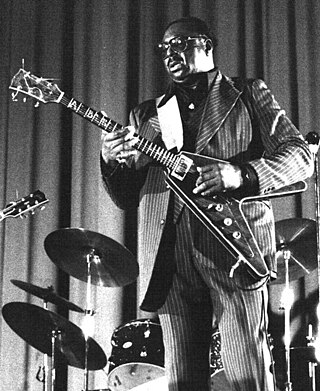
Albert Nelson, known by his stage name Albert King, was an American guitarist and singer who is often regarded as one of the greatest and most influential blues guitarists of all time. He is perhaps best known for his popular and influential album Born Under a Bad Sign (1967) and its title track. He, B. B. King, and Freddie King, all unrelated, were known as the "Three Kings of the Blues". The left-handed Albert King was known for his "deep, dramatic sound that was widely imitated by both blues and rock guitarists".
"Six Strings Down" is a blues song recorded by Jimmie Vaughan in 1994. It is a tribute to his brother, Stevie Ray Vaughan, who died in 1990, and the memory of other deceased guitarists. The song was written by Art Neville, Eric Kolb, Aaron Neville, Cyril Neville, Kelsey Smith, and Vaughan. It first appeared on Vaughan's album Strange Pleasure, in 1994.

Jimmie Lawrence Vaughan Jr. is an American blues rock guitarist and singer based in Austin, Texas. He is the older brother of the Texas blues guitarist Stevie Ray Vaughan. He was a founding member of the The Fabulous Thunderbirds.
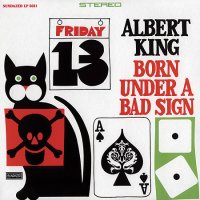
Born Under a Bad Sign is the second compilation album by American blues musician Albert King, released in August 1967 by Stax Records. It features eleven electric blues songs that were recorded from March 1966 to June 1967, throughout five different sessions. King played with two in-house bands: Booker T. & the M.G.'s and the Memphis Horns. Although the album failed to reach any music chart, it did receive positive reviews from music critics and is often cited as one of the greatest blues albums ever made. Born Under a Bad Sign influenced many guitarists, including Eric Clapton, Mike Bloomfield, Jimi Hendrix, and Stevie Ray Vaughan. Born Under a Bad Sign has been recognized by several music institutions, and has been inducted into the Blues Foundation Hall of Fame, the Grammy Hall of Fame, and the National Recording Registry.
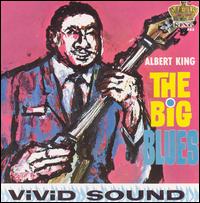
The Big Blues is a compilation album by Albert King, released by King Records in 1963. It is his first album and the only one before he signed with Stax Records, where he would record most albums during his career. The album was later reissued under the title Travelin' to California.

"Voodoo Child (Slight Return)" is a song written by Jimi Hendrix and recorded by the Jimi Hendrix Experience in 1968 that appears as the final track on the groups's third studio album, Electric Ladyland, released that year. It contains improvised guitar and a vocal from Hendrix, backed by Noel Redding on bass and Mitch Mitchell on drums. The song is one of Hendrix's best known; it was a feature of his concert performances throughout his career, and several live renditions were recorded and released on later albums.

Albert Cummings is an American blues musician, recording music with Blind Pig Records. He has played alongside artists such as B.B. King, Johnny Winter, and Buddy Guy.

"Sweet Home Chicago" is a blues standard first recorded by Robert Johnson in 1936. Although he is often credited as the songwriter, several songs have been identified as precedents. The song has become a popular anthem for the city of Chicago despite ambiguity in Johnson's original lyrics. Numerous artists have interpreted the song in a variety of styles.
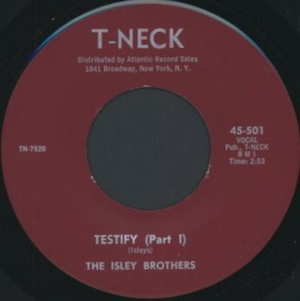
"Testify" is an uptempo soul song by the American rhythm and blues group the Isley Brothers. Written by the Isleys and recorded in 1964, it followed several successful singles by the group and was the first single to appear on their own T-Neck record label.

"Rock Me Baby" is a blues standard that has become one of the most recorded blues songs of all time. It originated as "Rockin' and Rollin'", a 1951 song by Lil' Son Jackson, itself inspired by earlier blues. Renditions by Muddy Waters and B.B. King made the song well-known. When B.B. King's recording of "Rock Me Baby" was released in 1964, it became his first single to reach the Top 40 in Billboard magazine's Hot 100 chart.

"Hide Away" or "Hideaway" is a blues guitar instrumental that has become "a standard for countless blues and rock musicians performing today". First recorded in 1960 by Freddie King, the song became a hit on the record charts. It has been interpreted and recorded by numerous blues and other musicians and has been recognized by the Rock and Roll Hall of Fame and the Grammy Hall of Fame.

In Session is a blues album by Albert King with Stevie Ray Vaughan recorded live for television on December 6, 1983, at CHCH-TV studios in Hamilton, Ontario, when Vaughan was 29 and King was 60. It was released as an album on August 17, 1999, and re-released with a supplemental video recording on DVD on September 28, 2010. It has also been released on CD and SACD.

"The Sky Is Crying" is a blues standard written and initially recorded by Elmore James in 1959. Called "one of his most durable compositions", "The Sky Is Crying" became a R&B record chart hit and has been interpreted and recorded by numerous artists.

Stevie Ray Vaughan was an American blues rock guitarist, singer, and songwriter, and the frontman for the band Double Trouble. He is often regarded as one of the greatest guitarists and blues musicians of all time. During his career, he released four studio albums, one live album, and several singles.

"Black Angel Blues", also known as "Sweet Black Angel" or "Sweet Little Angel", is a blues standard that has been recorded by numerous blues and other artists. The song was first recorded in 1930 by Lucille Bogan, one of the classic female blues singers. Bogan recorded it as a mid-tempo, twelve-bar blues, featuring her vocal with piano accompaniment.

"Crosscut Saw", or "Cross Cut Saw Blues" as it was first called, is a hokum-style song "that must have belonged to the general repertoire of the Delta blues". Mississippi bluesman Tommy McClennan's recording of the song was released in 1941 and has since been interpreted by many blues artists. "Crosscut Saw" became an early R&B chart hit for Albert King, "who made it one of the necessary pieces of modern blues".
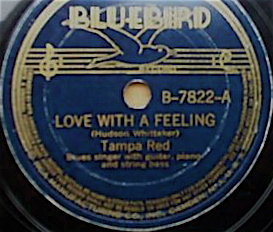
"You've Got to Love Her with a Feeling", or "Love with a Feeling" as it was originally titled, is a blues song first recorded by Tampa Red in 1938. Numerous blues artists have interpreted and recorded the song, making it a blues standard. When Freddie King adapted it in 1961, it became his first single to appear in the record charts.

Bill Carter is an American singer, songwriter, musician, and member of the Austin Music Hall of Fame. He is best known for co-writing "Crossfire" and "Willie The Wimp", recorded by Stevie Ray Vaughan; "Why Get Up?", recorded by The Fabulous Thunderbirds; and "Jacksboro Highway", recorded by John Mayall. Carter's songs have been covered by other blues, country, and rock artists including Waylon Jennings, Robert Palmer, Ruth Brown, Stray Cats, and Counting Crows.
